Sutton's World Cup quarter-final predictionspublished at 08:55 GMT 8 December 2022
BBC Sport's football expert Chris Sutton predicts the scores for the four World Cup quarter-finals in Qatar.
Read MoreBBC Sport's football expert Chris Sutton predicts the scores for the four World Cup quarter-finals in Qatar.
Read More BBC Monitoring
BBC Monitoring
The world through its media
A prominent Ethiopian opposition party, Ethiopian Citizens for Social Justice (Ezema), has called on the government to arm civilians so that they can defend themselves from attacks by rebels of the Oromo Liberation Army (OLA) in Oromia region.
"We would like to strongly emphasise that it is imperative to arm communities living in places that government security forces cannot easily reach, in a legitimate and organised manner, to enable them resolutely defend themselves," Ezema said in a statement posted on Facebook.
Ezema is one of the main opposition parties that agreed to work with the government, and its leader, Prof Berhanu Nega is the minister of education.
Its call follows attacks that have claimed the lives of hundreds of civilians, destroyed property and displaced millions in western Oromia.
Meanwhile, the spokesman of the rebel Tigray People's Liberation Front (TPLF) in northern Ethiopia, Getachew Reda, in a Twitter post, external accused federal authorities of fanning the conflict in Oromia.
 BBC World Service
BBC World Service
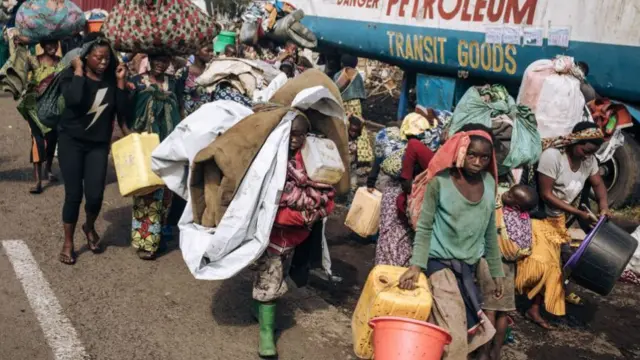 Image source, AFP
Image source, AFPThousands of people have been displaced by rebel activity in in eastern DR Congo
A UN investigation has found that at least 131 people were killed at the end of November in the eastern Democratic Republic of Congo at the hands of the M23 rebel group.
It says investigations have confirmed the deaths of the civilians in two villages - Kishishe and Bambo - in the Rutsuhuru district of North Kivu province.
The UN says the victims were executed in what appears to be a reprisal to the current government offensive.
"This violence was carried out as part of a campaign of murders, rapes, kidnappings and looting against two villages in the Rutshuru territory as reprisals for the clashes between the M23" and other groups, it says.
The M23 rebels, who have captured several towns near the borders of Rwanda and Uganda this year, have denied they are attacking civilians.
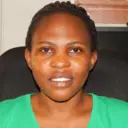 Patience Atuhaire
Patience Atuhaire
BBC News, Kampala
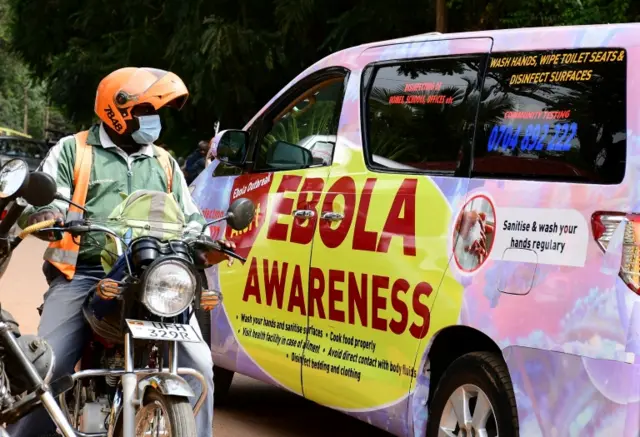 Image source, Reuters
Image source, ReutersUganda confirmed the outbreak of Ebola in September
Uganda has received 1,200 experimental vaccine doses designed to work against the Sudan strain of the Ebola virus that will be used in scientific trials.
The country has confirmed 142 cases of the Sudan strain, with 56 deaths, since it announced an outbreak of Ebola in September.
Currently, there is no vaccine proven to be effective against this strain of the viral haemorrhagic fever.
The vaccine will be administered to people who have been in contact with those who tested positive for the virus, in what is called ring vaccination.
Researchers hope to recruit at least 3,000 people, aged six years and above, to take part in the study, which will be conducted by a team of Ugandan scientists.
The vaccine, made by the Sabin Institute in the US, was given to the Ugandan government as a donation by the World Health Organization. It has already been proven to be safe for use in human trials.
There have been no new positive cases in Uganda in almost three weeks, and the last of the people who had been hospitalised were released on November 30.
There have been concerns that the vaccine doses have arrived at the tail end of the epidemic in Uganda.
But Health Minister Dr Jane Ruth Aceng has said the study is still necessary to equip the country with all the public health tools it needs to fight similar outbreaks in future.
Read more:
 BBC Monitoring
BBC Monitoring
The world through its media
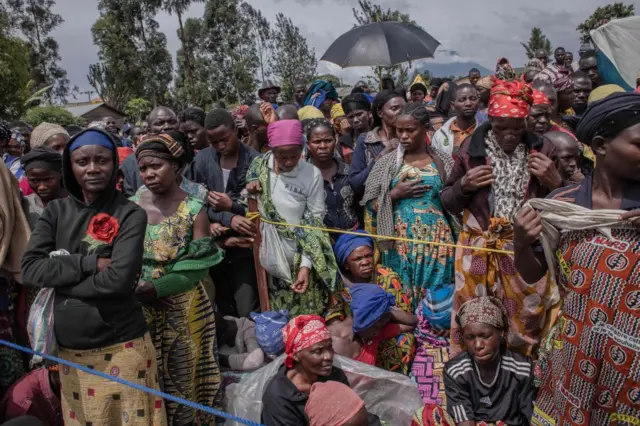 Image source, AFP
Image source, AFPThousands of people have been displaced by the violence in eastern DR Congo
The M23 rebel group in the Democratic Republic of Congo has condemned "genocide and targeted killings" against the Tutsi community by government forces and its allies in the east.
It said that the government's coalition forces had on Tuesday "attacked our positions in Bwiza and its surroundings, in total breach of the current ceasefire".
The M23 said government-allied forces had killed innocent civilians, destroying houses, looting and slaughtering their cattle, noting that the ongoing attacks had displaced civilians and wounded many.
"These targeted killings of Tutsi, and those who have rejected the genocide ideology by the said DR Congo government's coalition, while the international and national community remained tight-lipped, take us back to the time prior to the genocide of 1994 perpetrated against the Tutsi in Rwanda," it said in a statement.
The group has said that it will not "stand by and watch" as civilian populations get killed, adding that it's "ready to intervene and stop these horrific massacres".
The army has not spoken about the allegations but had last week accused the M23 of killing dozens of civilians in the eastern town of Kishishe, which the M23 denied.
The statement by the M23 comes after the group agreed to withdraw from occupied territory following sustained pressure from the government and international community following resolutions agreed on by heads of states during a recent meeting in the Angolan capital, Luanda.
Over 50 Congolese armed groups that attended peace talks which concluded this week in Nairobi also announced that they had agreed to lay down their weapons.
 BBC World Service
BBC World Service
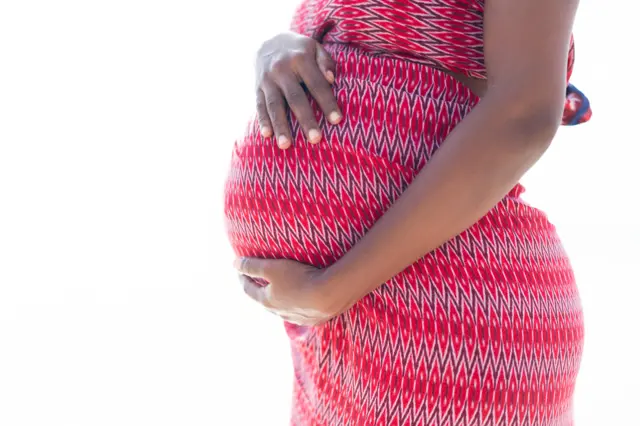 Image source, Getty Images
Image source, Getty ImagesExtreme heat is a health risk to an unborn child, a study on Gambian women has shown
New research shows that when a pregnant woman works in extreme heat, it can pose a health risk to her foetus.
The study monitored more than 90 subsistence farmers working in rice fields in The Gambia - in direct sun and often high humidity.
Researchers from the London School of Hygiene and Tropical Medicine said the heart rate of each mother's unborn child increased to dangerous levels.
They found the blood flow to the foetus slowed as the mother's placenta was impacted by the heat.
The scientists are calling for more research, with many locations facing rising temperatures.
Our proverb of the day:
Quote MessageAn animal caught in a deep trap stays quiet."
An Eton proverb from Cameroon sent by Albert Noah-Messomo in Bournemouth, UK.
Sarah Chan has overcome racism and violence to become the first woman to manage African scouting for a team in the NBA, the world's top professional basketball league.
Read MoreInvestigators say millions of dollars, intended to help unemployed youths, has gone missing.
Read MoreWe'll be back on Thursday morning
That's all for now from the BBC Africa Live team. There'll be an automated news feed until we're back on Thursday morning.
In the meantime, you can get the latest news from our website and the Africa Today podcast.
A reminder of our proverb of the day:
Quote MessageOld men feel uneasy when dry bones are mentioned in a proverb."
A Twi proverb sent by Adomako Barfi Richard in Ghana.
Click here to send us your African proverbs.
And we leave you with this photo of impala at Leopard Creek Country Club in Malelane, South Africa.
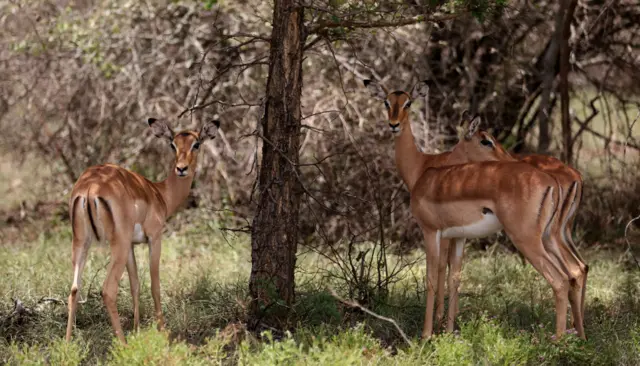 Image source, Getty Images
Image source, Getty Images Mayeni Jones
Mayeni Jones
BBC News, Lagos
The Reuters news agency says it has found evidence that the Nigerian military ran a secret mass abortion programme for at least nine years, targeted at women who had children by Boko Haram militants.
Many of the women had been kidnapped and raped by the Islamist militants in the country’s north-east.
The scale of the alleged programme is shocking - at least 10,000 women are thought to have had pregnancies terminated without consent, according to Reuters.
The news agency spoke to 33 women and girls who say they underwent abortions while in the custody of the Nigerian Army.
The women describe being given injections and pills – and only later finding out it was to abort their pregnancies.
Reuters also interviewed five healthcare workers and nine security personnel involved in the programme.
Procedures are said to have taken place as recently as November of last year.
Reuters was unable to establish who in the military or government created or ran the abortion programme.
Last week, days before the investigation was published, the defence ministry denied Reuters’ findings, saying that the story was an “insult on the Nigerian people and culture”, who “still cherish life”.
The statement lists a number of instances where the Nigerian military has provided help and support to women and children in need, including to some of the rescued Chibok girls, who had children while in detention, as well as the almost 5,000 Boko Haram fighters and family members who’ve surrendered to the Nigerian army since 2021.
The army also says it would have been impossible for it to carry out the abuses highlighted by Reuters, without the knowledge of the UN and aid agencies that work in north-eastern Nigeria.
 Will Ross
Will Ross
Africa editor, BBC World Service
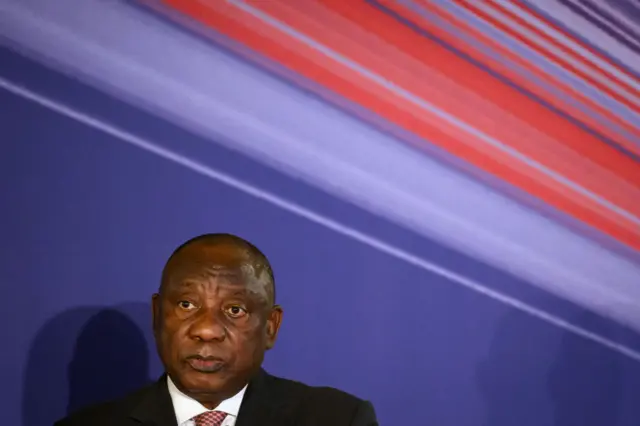 Image source, Getty Images
Image source, Getty ImagesSouth Africa's president is seeking re-election as the governing ANC's leader later this month
South Africa’s Tourism Minister Lindiwe Sisulu has called on the president to resign.
Cyril Ramaphosa is facing allegations that he covered up the theft of a huge sum of money from his farm.
The controversy comes ahead of next month's ANC conference with the president seeking a second term in office.
Ms Sisulu - who says she wants the top job herself - told the BBC's Newshour programme that Mr Ramaphosa should step down, as he was holding the whole party to ransom.
Next week parliament is due to discuss the issue and the president, who denies any wrongdoing, could potentially face impeachment.
Read more about Mr Ramaphosa's corruption scandal here.
Michelle Katami
BBC Sport Africa
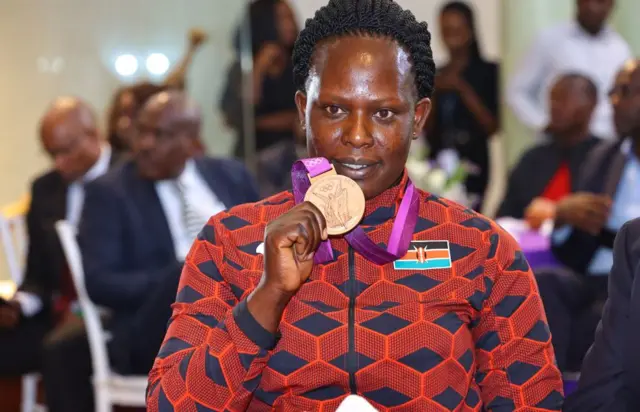 Image source, NOCK-Kenya Media
Image source, NOCK-Kenya MediaPamela Jelimo said waiting so many years was painful
Ten years after finishing fourth in the 800m final at the 2012 Olympic Games in London, Kenya’s Pamela Jelimo has received a bronze medal.
Jelimo, popularly known as Eldoret Express, was given the medal following the International Olympic Committee's (IOC) disqualification of Russia’s Mariya Savinova due to a doping violation in 2015.
Savinova won the 800m gold medal in 2012.
Speaking to the BBC, Jelimo condemned doping in sports, saying it was "a menace for an athlete to progress career-wise",
"This is like a dream. I initially didn’t believe it when I heard the good news. It’s truly a dream of every athlete to win a medal in the Olympics and I’m honoured to have my parents accompany me and share this joy.”
The reallocation ceremony comes at a time when Kenya is in the spotlight due to high cases of doping and has recently escaped an international ban.
Read more: Kenya looks to criminalise doping in athletics after string of cases
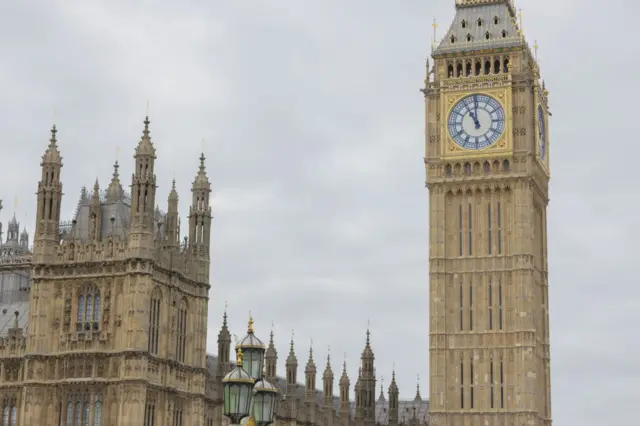 Image source, Getty Images
Image source, Getty ImagesOne British MP said the Eritrean testimonies had brought him to tears
An exhibition about Eritrea’s disappeared former government officials and journalists has been launched in the UK parliament.
On Tuesday, MPs from the All-Party Parliamentary Group for Eritrea (APPG) called for the release of the disappeared and improvement of human rights in Eritrea.
Lord Alton of Liverpool, who has been critical of Eritrea’s human rights situation, said the exhibition would help highlight the plight of the missing.
Among those detained since September 2001 are former senior ministers, members of the now suspended National Assembly and senior military generals.
The group of officials, known G-15, wrote an open letter demanding accountability and democratic reforms.
Patrick Grady, a British SNP MP, who spoke at the exhibition's launch spoke of the devastating stories he had heard: “Over the years we have heard testimonies that brought us to tears.
“Testimonies from families who do not know where mothers, fathers, sons, daughters, children, other relatives are or if they are even alive.”
Eleven of the G-15 group were arrested after criticising President Isaias Afwerki, who has ruled the country since 1991.
He refused to implement an already ratified constitution, suspended the National Assembly and has never held national elections.
In the wake of the high-profile arrests, President Isaias’ government also shut down all private newspapers and arrested many of its editors and journalists.
The arrested have never appeared in any court of law, and have been held incommunicado for over 20 years. Human rights groups say there are many others who have disappeared after their arrest by security authorities since 1991.
Eritrean officials have always rejected accusations of human rights abuses as demonisation by the West.
The exhibition organised in collaboration with Pen Eritrea, Eritrea Focus and Amnesty International will be open until Friday.
Read more: Jailed without trace in Eritrea: 'I haven't seen my parents for 17 years'
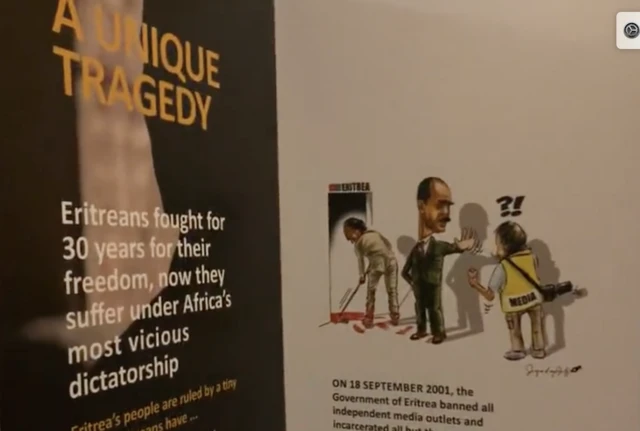 Image source, APPGEritrea
Image source, APPGEritrea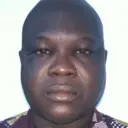 Nichola Mandil
Nichola Mandil
BBC News, Juba
The humanitarian community in South Sudan has strongly condemned the ongoing violence in the oil-producing Upper Nile State in the northern part of the country.
They are calling for the hostilities to cease immediately in order to reduce human suffering and prevent further loss of innocent lives.
The UN Office for Coordination of Humanitarian Affairs (Ocha) reported on Wednesday that more than 9,100 people were displaced following the recent surge of violence in Fashoda County.
The renewed clashes between armed youths have also resulted in civilian deaths and injuries, abductions of women and children and the destruction of properties and livelihoods, There were also reports of incidences of gender-based violence, Ocha said.
It did not provide details regarding casualties, but local media reported that countless numbers of people were killed in the renewed violence.
"The humanitarian community in South Sudan is appalled by the continuous violence that has a devastating impact on the lives and livelihoods of ordinary women, men and children – those vulnerable who are already affected by the dire humanitarian situation in the country suffer most," said Peter Van der Auweraert, the UN Acting Humanitarian Coordinator in South Sudan.
Kenya's government intends to criminalise doping in athletics in an attempt to bring an end to a string of cases in the sport.
Read MoreNkechi Ogbonna
BBC News, Lagos
 Image source, Getty Images
Image source, Getty ImagesD'banj is known the world over for his international hit song Oliver Twist
Popular Nigerian artist Oladapo Oyebanjo, popularly known as D’banj, has been arrested over alleged fraud.
In a tweet on its official handle, external, the Independent Corrupt Practices and other Related Offences Commission (ICPC) confirmed the arrest of the musician over allegedly fraudulent activities associated with the N-Power Programme - a government scheme set up to address youth unemployment and empowerment.
The ICPC says it is investigating claims by N-Power beneficiaries who say they have not received monthly funds despite payment by the government, alleging a diversion of money worth “billions of Naira”.
The agency said about 10 people had been invited by the ICPC over the last few months to answer questions in connection with the alleged N-Power fraud, and had been granted bail after their detention.
Several invitations sent to Mr Oyebanjo to appear before a team of investigators were ignored, the body said.
Representatives for Mr Oyebanjo have not yet commented.
D’banj is a Nigerian Afrobeat star and entrepreneur with many hit songs, awards and brand endorsements under his belt.
Allow X content?
This article contains content provided by X. We ask for your permission before anything is loaded, as they may be using cookies and other technologies. You may want to read X’s cookie policy, external and privacy policy, external before accepting. To view this content choose ‘accept and continue’.
Officials say a trend in which users film blurred naked videos is used to infect phones with viruses.
Read MoreJanusz Walus was stabbed last week by another inmate, delaying his release in South Africa.
Read More Pumza Fihlani
Pumza Fihlani
BBC News, Johannesburg
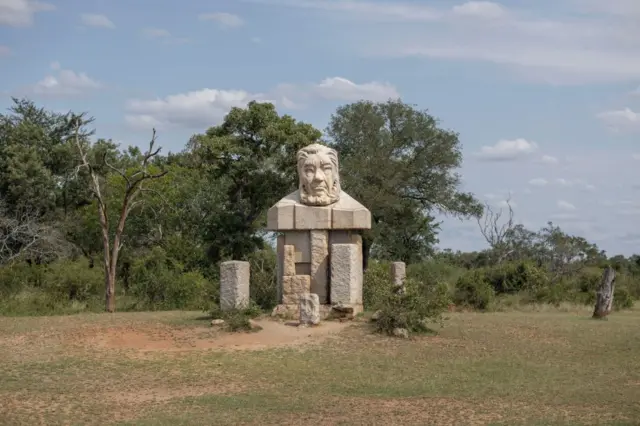 Image source, AFP
Image source, AFPPoaching is a huge problem in South Africa's parks
Two former Kruger National Park rangers have been sentenced to seven years in prison each for poaching-related crimes, according to South Africa's prosecuting authority.
Hendrick Experience Silinda, 31, and Achieve Musa Mlambo, 38, who were employed by the South African National Parks (SANparks) at the time of their arrest, were sentenced in the Skukuza regional court in Mpumalanga province.
On 26 February 2019, the pair were on duty when regional rangers received information that poachers were going to enter the Kruger National Park, with the assistance of the Skukuza rangers, prosecuting officials said.
Following the tip-off, authorities found the accused pair in possession of a hunting rifle, live ammunition, a silencer, and three hunting knives.
Ballistics evidence showed that the rifle was not from SANparks, suggesting it was brought in to assist the poachers.
SANparks spokesperson Isaac Phaahla told the BBC that this was the second conviction involving Kruger Park staff.
The first one was last year – relating to a 2017 case – involving a now ex-ranger. He was sentenced to 17 years behind bars.
In the latest case, both men have maintained their innocence. In court they pleaded not guilty and said they were framed but provided no evidence of this.
Poaching is a pernicious problem in South Africa's wildlife parks.
Organised syndicates from South Africa and neighbouring countries are said to be involved in the lucrative illegal trade of rhino horn - often smuggled to Asia, according to special crimes investigators.
Mr Phaahla said there were a number of cases before the courts involving their staff but finalising them can take years due to postponements or suspects changing lawyers.
He added that about six Kruger staff members were currently on trial in different cases relating to poaching crimes.